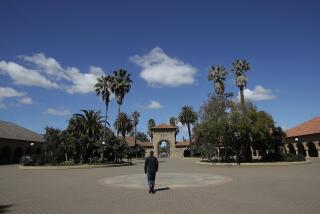L.A. Community Colleges Seek Ties With Historically Black Institutions
Los Angeles community colleges are trying to forge new connections with the nationâs historically black colleges and universities to increase the number of African American students who transfer between the two groups.
The effort is related to a new nationwide project to establish such links. A majority of African Americans begin their post-secondary studies in community colleges. And there are more than 100 historically black colleges and universities around the country, most of them in southern and eastern states. Among them are Howard, Morehouse and Spelman universities.
âThis is a way of giving students another pipeline of opportunity, and another reason to go to college,â said Philip Day, chancellor of the City College of San Francisco, which began efforts to reach out to black colleges in the late â90s, and is taking a lead role in the national effort.
A network of college representatives is working on agreements to allow community college students to transfer easily into the historically black institutions. In the Los Angeles district and at Compton College, officials are negotiating transfer agreements with six historically black schools in the coming year, most of them in Georgia.
Simplifying transfer is only part of the effort. More important, say participants, is to increase cooperation so that black students in California become more aware of opportunities beyond the stateâs borders.
Corwin Cooley, 24, a black student who recently graduated from Clark Atlanta University in Georgia, is a case in point. Cooley said he never would have considered Clark or any other traditionally black, or private, liberal arts college if San Francisco City College hadnât presented him with the option.
âI never thought I would up and go to college in a whole other state. These schools didnât even exist to us in high school,â said Cooley, who is from the Bayview area of San Francisco.
â I canât even explain it to you,â said Cooley, a camera operator for a Chinese-language television station. âItâs mind-blowing when you think about it--that you donât even think of leaving the state because you are so limited in what you know.â
Meanwhile, recruiters for the University of California are struggling to increase their numbers of transfer students, particularly minority students.
Day said the intent of the new push for black colleges is not to interfere with UCâs efforts to recruit black students. However, if the effort puts additional pressure on the UCs, he doesnât mind too much.
âDo I think the UCs should do more recruiting at the community colleges? Absolutely. Yes I do,â he said. And if historically black colleges provide more competition, he added, âI donât care.â
Many students who attend black colleges may not be the same ones who apply to UC because entrance requirements differ, say UC and community college officials. In some cases, it is tougher to get into a UC.
âI donât think there will be a lot of competition,â said Raymund Paredes, vice chancellor of academic development at UCLA. âWe should work together to give African American students every opportunity we can.â
More to Read
Sign up for Essential California
The most important California stories and recommendations in your inbox every morning.
You may occasionally receive promotional content from the Los Angeles Times.










